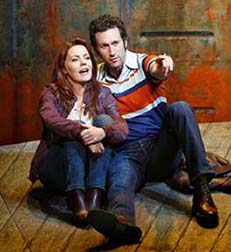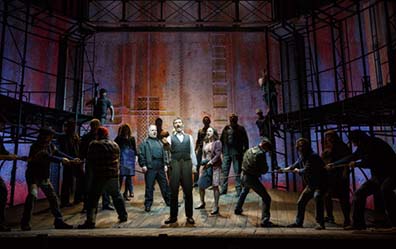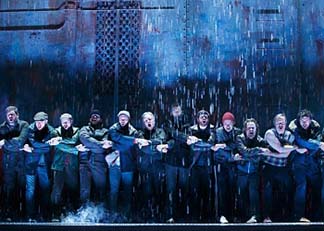By Lucy Komisar
The problem with “The Last Ship,” a recitative musical written by John Logan and Brian Yorkey, with music and lyrics by pop artist Sting, is politics. In a play about workers‘ response to the closing of their shipyard, there really isn‘t any. The play is a feel-good story about workers taking over the shipyard to build one last ship to sail around the world. And then what? How does that challenge or even explain the forces that closed their shipyard?

The story begins when the young man, Gideon Fletcher (Michael Esper), rejects his father‘s wish – symbolically represented by a gift of his work boots – that he follow him as a shipyard worker in Newcastle. Instead, Gideon leaves home and girlfriend, Meg Dawson (Rachel Tucker), to see the world and make his fortune.
When he returns fifteen years later, his father (Jamie Jackson) has died, Meg is living with a local worker, Arthur Millburn (Aaron Lazar), and she has a son, (Collin Kelly-Sordelet). The workers‘ lives are being upended. The shipyard can‘t continue, because ships are built more cheaply in Japan and South Korea. The yard has been sold to a big money player who wants to use it for a salvage business and offers the workers jobs in the scrapyard – at much lower pay. Arthur has signed on to the salvage operation. But the other workers, led by foreman Jackie White (Jimmy Nail), refuse. (Sting does Nail‘s role Dec. 9 to Jan. 25.)
Father O‘Brien (Fred Applegate), a charming hard-drinking fellow who is anything but judgmental when it comes to sin, calls on them to build one last ship. A militant declares they should “occupy” the shipyard – wonder where they got that phrase. They declare, “We‘ll take back the shipyard or end up in jail.” Well, not exactly. The priest‘s symbolic solution defuses that militance.

As in the best of Broadway, where production values often trump ideas, director Joe Mantello does a good job making the musical smart and zippy. It‘s not due to Sting‘s music, which may have fans in the pop music world, and at first has the charm seen in the title song, but is too repetitive when the sound is the same in every scene.
Worker militancy is expressed in rousing production numbers. In Steven Hoggett‘s choreography, the workers have rough, muscular movements. Nice the first time, but he uses the same step in almost every number. I like the fact that the workers have every kind of ordinary face.

There‘s a charming scene where Gideon attempts to teach Tom (revealed to be his son) a necessary skill in “The Night the Pugilist Learned How to Dance.” And a good feminist, “If You Ever See Me Talking to a Sailor,” with the line, “A sailor‘s not a man to be trusted.”
I liked David Zinn‘s sets, including a collection of steel pipes and high walkways, with the gray backdrop finally becoming the hull of the ship. And the actors are all fine. I especially liked the lilting voice of Tucker as Meg.
The problem is the script. The story could have been the platform for a musical polemic about the downsizing of opportunities for workers caused by politicians‘ embrace of globalization.

Think how Lee Hall, with Elton John‘s music, used “Billy Elliot” to recount the struggle of British miners to save their jobs in the face of the virulent anti-unionism of then Prime Minister Margaret Thatcher. It includes a wonderful anti-Thatcher song sung to a giant puppet of that nasty lady.
But this play has no challenge by the workers to the forces taking away their jobs. There‘s no suggestion the men will take over the shipyard. The workers opt for symbolism instead of change. Building one last ship is an empty victory. The play misses the political context that could have given it meaning.
“The Last Ship.” Written by John Logan and Brian Yorkey; music and lyrics by Sting; directed by Joe Mantello. Neil Simon Theatre, 250 West 52nd Street, New York City. 877-250-2929. Opened Oct 26, 2014; closes Jan 24, 2015. 12/25/14.

